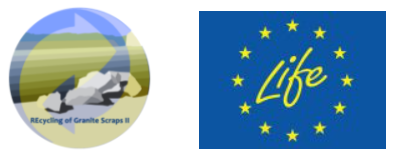LIFE REGS II - Recycling of granite scraps II
 BACKGROUND
BACKGROUND
Italy is the world's second-largest feldspar producer (3 million tons/year, 22% of total) and the worlds biggest importer (22% of global world trades). The EU ceramics sector is strongly dependent on feldspar imports from Turkey and strong demand is rapidly depleting the proven reserves in EU Member States; in the future, it will be necessary to find additional feldspars sources or further increase inter-continental transport. The ever-increasing demand for feldspar, for ceramics, glass and other industrial uses, therefore requires the mining of granite and considerable international trade flows. At present, Buddus-Al dei Sardi (Italy) is the most important granite production area in Italy, with 66 authorised quarries (12 active), 70% of regional granite production and more than 50% of total Italian production. However, granite mining activities cause serious environmental problems. In Italy, every year 350 000-400 000 m3 of raw granite are extracted, generating the same quantity of waste. Feldspar production and trade generate large amounts of pollutant and greenhouse gas emissions, due either to the energy consumption of mining activities or from the transport of the finished product from the exporting countries (mainly Turkey and China). The areas where quarries are active suffer from landscape degradation, due to incomplete compliance or non-compliance with quarry recovery plans, considering that opening new quarries is cheaper than moving large amounts of waste. Finally, granite mining accounts for huge amounts of soil consumption, as it requires large areas in which the quarry waste accumulates.
OBJECTIVES
The LIFE REGS II project aims at demonstrating an innovative and economically-viable extraction technology to produce feldspars, of the same quality to those obtained from virgin raw material, using granite scraps rather than virgin raw material. This will reduce demand for feldspar from environmentally-damaging granite mining operations.
The specific objectives are:
- Increasing the resource productivity of minerals extraction;
- Verifying the technical and economic possibility to replicate the identified technology in other contexts in the EU, also using different types of granite scraps;
- Verifying the possibility to transfer the technology and process to other areas, in other contexts (e.g. granite processing sludge);
- Creating an example of long-term cooperation between research centres, public authorities in charge of mining activities, and the private sector, to address systematically the issue of efficiency in raw materials use;
- Reduction of the carbon footprint as compared to the present feldspar production process, through the optimisation of transport in terms of distance, weight and volume and the use of 100% renewable energy for the process, with a dedicated wind energy plant;
- Reduction of soil consumption by the reuse of waste and the exploitation of areas cleared from scraps in the existing mines, which in turn can decrease the need to open new quarries; and
- Supporting the Sardinian Regional Mine Agency, by defining a recovery strategy for Buddus mine district.
The project will contribute to the implementation of the EU Action Plan for the Circular Economy, the Roadmap for a Resource Efficient Europe, and Directive 2006/21/EC on the management of waste from extractive industries.
RESULTS
Expected results:
- Removal of 47 000 t of granite waste and production of 30 000 t of feldspar, in two periods: - during the pre-operational period (6 months), 10 000 t of waste processed, with an output of 3 500 t of tradable feldspars and 6 500 t of non-tradable silicate sands, avoiding the extraction of 5 900 t of new materials; and - during the 9 months of operational period, 26 500 t of feldspars, for a total consumption of more than 37 000 t of granite waste and avoiding the extraction of 45 000 t of new materials;
- Building of a plant that, by project end, is expected to absorb at least 50 000 t/year of waste, growing to 70 000 t/year within three years of operations;
- Reduction of the environmental footprint for transport: saving of about 200 t of CO2 (685 t after 3 years);
- Construction of a wind power plant to supply all the energy needs of the project (about 2 200 MWh/year);
- Restoration of an area of about 10 hectares, avoiding a net soil consumption of about 1 400-2 000 m2; and
- The definition of an industrial district-level granite waste management plan, to be approved by the Mines Department of the Regione Sardegna, to collect updated data on quantity and quality of granite scraps in the Buddus/Monte Acuto area.
Participants
- Internazionale graniti spa, Italy
- Regione Sardegna - Assessorato Industria - Servizio attività estrattive e recupero ambientale - Settore Attività di cava, Italy
- Comune di Buddusò, Italy
- C.N.R. - Istituto di Geologia Ambientale e Geoingegneria, Italy
- Soro Giorgino Angelo &C, snc, Italy
